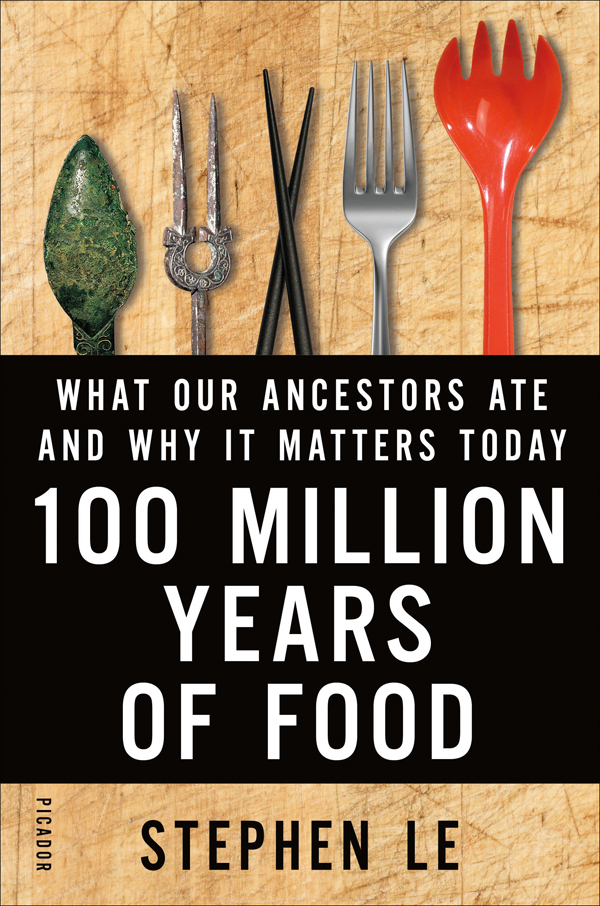
100 Million Years of Food
What Our Ancestors Ate and Why It Matters Today
کتاب های مرتبط
- اطلاعات
- نقد و بررسی
- دیدگاه کاربران
نقد و بررسی

November 15, 2015
A biology professor traverses the globe to explore the evolution of food. In this accessible debut, Le offers a nimble hybrid that is equal parts travel memoir and informed speculation about the biology of human nutrition. The author, with roots in Vietnam and Canada, also explores how different cultures approach food in support of his thesis that straying from one's ancestral diets is a leading cause of modern disease. It's a surprisingly cleareyed approach that demonstrates Le's awareness of trendy diets like the paleo approach while also allowing him to dig into the science behind the effects that eating has on our lives. Starting off in Vietnam to explore the now-exotic inclusion of insects in one's diet, the author traveled the world to explore the history of meat, fish, fruits, and starches in far-flung locales. It's not always pretty--the chapter "A Truce Among Thieves" delves uncomfortably into the weird world of parasites and the drawbacks of modern hygiene on our digestive and immune systems. In an interesting diversion for what is nominally a scientific inquiry, Le doesn't confine what he learns to a restrictive definition for health, as he notes in his chapter on meat. "In other words, the robustness of meat-eaters and the long lives of meat-abstainers are two sides of the same biological coin," he writes. "It all depends on how you define healthy. Does healthy mean being in a great mood and being fertile and stronger at a younger age, or does healthy mean delaying cancer for a couple of years and hanging out with your great-grandchildren?" This line of inquiry continues in the book's penultimate chapter, "The Future of Food," in which Le chronicles his discussions with proponents of different diets and lifestyles, none of whom can agree on a best approach. The book's conclusions about what to eat and drink are common sense, but the journey Le takes to get us there is worth the cover price.
COPYRIGHT(2015) Kirkus Reviews, ALL RIGHTS RESERVED.

December 1, 2015
Le (biology, Univ. of Ottawa) believes that adverse health conditions have arisen from changes that have made our food unlike what our ancestors ate. He uses an evolutionary biology perspective to chart alterations in dietary practices from primitive times to the present day in an attempt to understand the best type of diet for us to follow. Le begins by investigating specific categories of food, such as insects, fruit, meat, fish, plants, alcohol, and milk. He also postulates on the causes of nutritional deficiencies and the prevalence of food allergies in modern times. Summations of scientific articles are used as evidence throughout, although detailed analysis is lacking. The account is interspersed with anecdotes from Le's travels, in which he meets entrepreneurs and foodies who are passionate about traditional food and sustainability. The book ends with the author's recommendations for eating well, which include consuming the traditional foods one's ancestors enjoyed, sustainable eating, moderate exercise, safe germ and sun exposure, and cooking at low heat. VERDICT An intriguing viewpoint on how dietary practices have changed over time, but further research is needed to support some of Le's healthy living recommendations--Rebekah Kati, Durham, NC
Copyright 2015 Library Journal, LLC Used with permission.

February 1, 2016
When it comes to food, early humans knew best, according to Le, a biological anthropologist. Modern diets, high in processed white as snow rice and other carbohydrates, increase the risk of diseases of western civilization, such as obesity and type 2 diabetes. Le travels to and dines in Kenya, Australia, and Vietnam, his parents' birthplace, where he eats a high-protein centipede. He carefully distinguishes between short-term and long-term health benefits of different diets. High-dairy, high-meat diets improve muscle mass and may help elderly people be less frail, but they're also more likely to lead to shorter lives. By contrast, Dean Ornish's low-meat, low-fat diet seems better for longevity but is tricky to sustain. Ideally, people should keep moving, consume less meat and dairy at young ages, and eat like their own ancestors. For example, Inuit children are genetically adapted to be dairy free, so they can wind up with dangerous levels of calcium in their blood (and potential kidney damage) if they switch to North Americanstyle diets. Le mixes advice, personal anecdotes, and medical science in this fascinating food-for-thought narrative.(Reprinted with permission of Booklist, copyright 2016, American Library Association.)

























دیدگاه کاربران